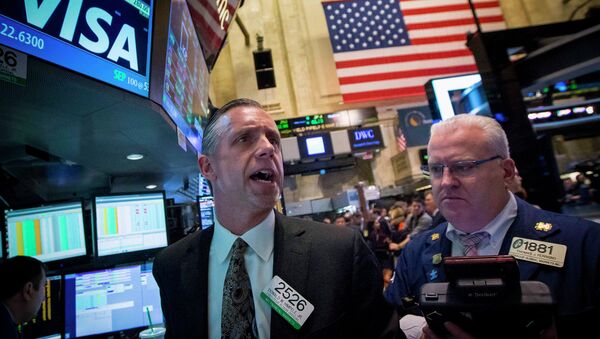Kristian Rouz — Shares in Asia-Pacific retreated during Thursday’s trading as the Japanese yen strengthened against the dollar, bearing risks to the corporate revenues in the region. The greenback, in turn, was down as crude oil appreciated after the Saudis eagerly rushed into the muddy waters of yet another Middle Eastern military escalation, attempting to crush the Shiite Houthi organization that came to prominence in Yemeni domestic politics over the past year.
The US dollar retreated to its one-month lowest at 118.94 yen, however, a pricier oil was not the only factor. Wall Street underperformed on Wednesday with significant losses the in tech sector, the driving force behind most of America’s industries, as market participants believe a stronger dollar would hurt corporate America’s earnings. Weirdly, yields on 10-year US Treasuries retreated as well, down to 1.91%, meaning the Middle Eastern risks are not the only concern for the US. The corporate sector is feverish ahead of the reporting timeframe due to the abundance of pessimistic forecasts.
As the yen advanced, a negative sign for most Japanese export-oriented industries, the Japanese markets went down. The Nikkei 225 Index lost 1.6%, the largest one-day retreat since mid-January, while the MSCI APEX sans Japan Index dropped 0.8%. In Australia, S&P/ASX 200 retreated 1.4% — the nation’s central bank launched a QE program earlier this month, but that does not seem to help much amidst the major global turbulence, besides, the commodities are still cheap, and the main consumer of raw materials, China, is feeling worse than the last 25 years’ average.
Wednesday’s session on Wall Street demonstrated the US stocks can’t pick up to extend the gains of recent months, as the tech equities have seen a significant sell-out, slightly reminiscent of the ‘dotcom crash’ of 2000. The S&P500 shed 1.5% Wednesday, its 26th consecutive day with no substantial advance. Biotech companies have performed the worst.
Effective wages are stagnating in the US, while the home prices have been surging 13% faster than the real disposable household income, meaning the effective demand for real estate is shrinking. A stronger dollar, however, means your average American can afford to buy more, but US big business is unhappy with the large part of its earnings still being made overseas, in looser monetary surroundings.
The euro advanced against the dollar, to $1.0989, compared to its recent lowest at $1.0457, as the eurozone is accelerating at a fast pace. The gap between European optimism and American pessimism is the widest since mid-February when severe weather conditions weighed on the pace of expansion of the US economy.
With yields on US Treasuries lower, the American economy is less risky now, providing less money-making opportunities though. Now, most major currencies depreciated 24% against the US dollar since 2011, but without structural reforms other nations will hardly see any investment money leaving the US for them, no matter how much America’s situation may deteriorate.
European markets took a blow after the Borse Dubai, the largest investor in the London Stock Exchange, sold its stake of $2.23 bln in England’s biggest equity market. The LSE was 8.2% down on the news. To an even greater disarray, the British microelectronics flagship, ARM Holdings, having lost 6% on Nasdaq on Wednesday, continued falling on the other side of Atlantic, retreating as much as 4.8% on the LSE. The direct reason is weak computer sales, but the larger picture is that low worldwide inflation is now hitting the best stocks in the tech sector.
The FTSEurofirst Index of top European stocks shed 0.9%, despite energy sector rallying 1.7% on the Yemeni news. In Frankfurt, the DAX Index retreated 1.5% as the technologically advanced and now export-dependent Germany was hit by more expensive energy costs.






